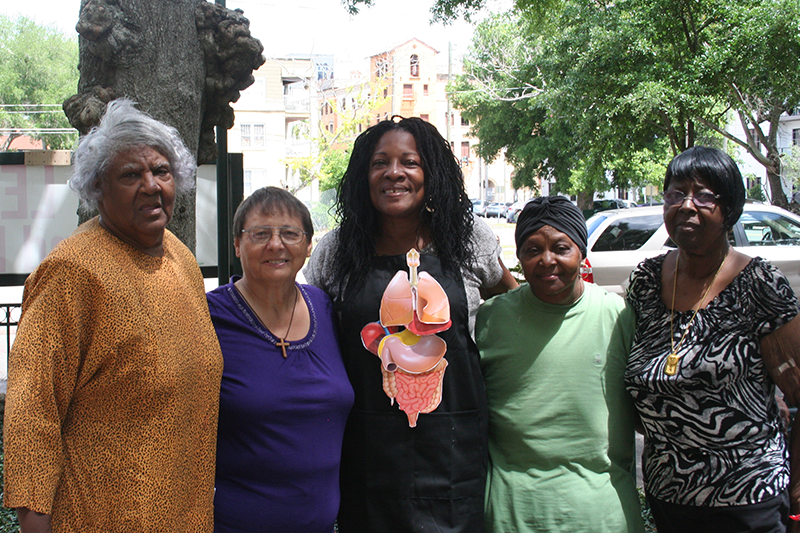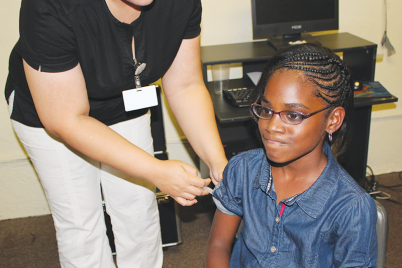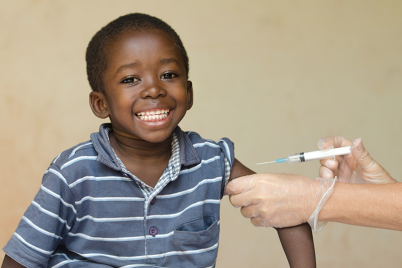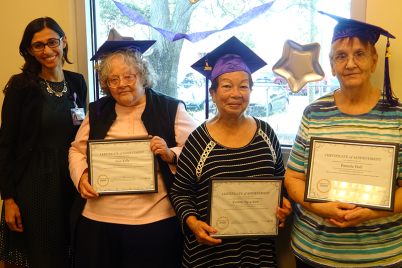The Viridian Apartment class: (L,R) Sally Rush, Violet Prepost, Faye Watson, Diane Works and Queen Robinson
By J.A. Jones, Staff Writer
PINELLAS COUNTY – According to the Pinellas County 2018 Community Health Assessment, 10.5-11 percent of surveyed Pinellas adults have been diagnosed with diabetes. The county’s death rate from diabetes (20.5 per 100,000) is higher than the state average (19.6 per 100,000).
Uncontrolled diabetes can have serious consequences. It is the most common cause of blindness, kidney failure and amputations in adults and a leading cause of heart disease and stroke.
Health Services Advisory Group, Inc. (HSAG), Florida’s Medicare Quality Improvement agency, works with physicians, hospitals and health providers to improve the care of people on Medicare. Through their Everyone with Diabetes Counts (EDC) program, they have established peer educators and trainers to offer diabetes self-management education classes.
The classes help people with diabetes and prediabetes learn skills to effectively manage their disease through healthy eating, being physically active, self-monitoring blood glucose, taking medication, problem-solving, reducing risks and handling stress. The classes are taught for two hours each week for six weeks and cover different topics each session. There is no cost to participate.
Developing and Building Community Services (DABCS) Inc.–a nonprofit whose mission includes building the sustainability of Pinellas communities by offering service programs that help impact the conscious thinking of a community and pave the way to leading healthier, happier lives–is partnering with HSAG to help educate those with diabetes.
DABCS is now offering the HSAG sponsored EDC free six-week self-management training program to churches, community centers, seniors organizations and schools that provide support services or classes to adults on Medicare.
“My first thought was to understand diabetes,” said Faye Watson of DABCS. While she knew that diabetes was impacting a large number of residents in south Pinellas, she said she was shocked to find out just how many people are impacted.
According to the Florida Department of Health’s Pinellas County, the Centers for Disease Control and Prevention states that while the number of people diagnosed with the disease has tripled nationally in the last two decades, one out of every four Americans with diabetes doesn’t know they have it.
The Florida Department of Health estimates that more than 2.4 million people in the state have full onset diabetes, while at least 5.8 million more Floridians are prediabetic. It lists diabetes as the seventh leading cause of death in the state.
Watson travels the field to recruit eligible participants who have been diagnosed with diabetes or pre-diabetes to give them a better understanding of how to self-manage their condition. As a certified peer educator, she teaches diabetes self-management classes.
She explained that a large part of the training program is focused on helping participants understand how diabetes impacts their life from the micro – including the disease’s impacts on their organs and overall health – to the macro, which includes encouraging participants to look beyond their disease to create support groups that will help them develop healthy lifestyles overall.
Currently, Watson teaches at the Viridian apartment complex on Third Avenue South. She meets about nine participants once a week for two hours to talk about the challenges they’re facing — including their diabetes management, healthy eating and meal planning, physical exercise, dealing with doctors and health care providers.
Their group also discusses the impact on participants’ day-to-day living such as dealing with depression and how they can change their condition and self-care habits to improve their health and continue “living their best life,” as Watson put it.
Violet Prepost controls her diabetes through medication, diet, exercise and education. She highly recommends the class.
“Excellent class,” Prepost said. “There is lots of information on helping to control diabetes and diet and understanding how the body works with food. I recommend anyone to take the class even if they don’t have diabetes now and want to understand.”
Watson believes a large part of what is working within the program is the relationships the participants have started building with each other.
“It is my hope they can maintain these relationships and build support groups beyond this six-week training,” she shared.
For instance, Tilden Johnson is a disabled veteran who was told he had diabetes but not what could happen if he didn’t keep it in control or even how to control it. He said the classes are an eye opener, and listening to other people’s experiences helped him understand the severity of the disease and the need to control it.
“Changing my diet is the hardest challenge not exercise because I walk every day. The class makes you care about people with diabetes, not just yourself. The information is a wakeup call, and I can’t wait to attend. Ms. Faye is encouraging us to form a support group, and I think that is a good idea,” he stated.
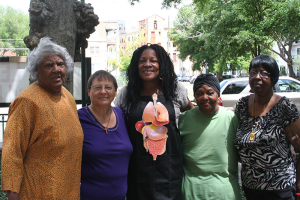 As a peer educator, Watson can offer the six-week training in any facility including churches, schools, and recreation centers, and she’s hoping to spread the vital information to more church groups and community groups.
As a peer educator, Watson can offer the six-week training in any facility including churches, schools, and recreation centers, and she’s hoping to spread the vital information to more church groups and community groups.
For more information on bringing the program to your facility or group, or if you or someone you know is a Medicare beneficiary with diabetes or prediabetes, contact Faye Watson at 727-692-9570, or by email at Faye@dabcservices.org. Family, friends and caregivers who do not have diabetes are also welcome to attend.
To reach J.A. Jones, email jjones@theweeklychallenger.com

